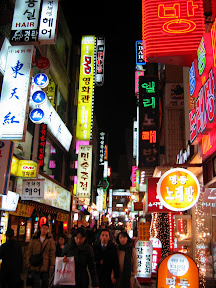Weekend Dads of Kanto
Saturday, January 6th, 2007The Tsukuba Express train line opened in late 2005, linking large areas of Chiba and Ibaraki prefectures with high speed Tokyo-bound rail service. Although I live in a tiny rural town surrounded by rice paddies, I can be in Tokyo in about an hour. Tokyo’s proximity to small towns has spurned the social phenomenon of the weekend dad. Thousands of families choose to live in suburban and rural Kanto, away from crowded Tokyo, while the breadwinner lives in the big city five nights a week in an apartment or dormitory.
Every Friday the salarymen fathers and husbands of Kanto board trains like the Tsukuba Express to start their weekly family time. It is a somber procession of silence, where passenger’s eyes tell stories of lonely lives spent more often drinking with the boss or sleeping than with their families. I’m on a car full of these shells. Half of them will spend their precious family time hungover or sleeping off exhaustion. It is a strange way to end this trip, and I find it more difficult to ignore these sad characters like I usually do. There is something about Tokyo that is different from the rest of Japan. There is an air of hopeless dedication that reaches such heights as to choke off any dreams of a better life, as if such a possibility could never even exist. In the past year I’ve become more disillusioned with the capital. It’s not the crowds and pace that I can’t stand, but the faces of these men; their mechanical lives. I feel empty in their presence.
It is 12:26am. I’m on the second to last train bound for Moriya. I’m tired and hungry and want to go home. I hope I can transfer trains in Moriya, but it’s late and I don’t expect the rural Joso line to be running at this hour. I made the decision in Tokyo that if I’m going to be stuck somewhere tonight, I should be stuck somewhere I can camp. I imagine I’ll be stuck in Moriya. The man next to me is very drunk and very unhappy. He keeps pounding his fist into his forehead, recounting some awful memory. I shift to the other side of the car. I can’t watch him anymore.
It is fitting for me to see this now after experiencing so much of western Honshu. My past year in Japan has made me steadily more negative about society here. When I look at the sad faces of commuter trains or hear the stories of infidelity, divorce, or loveless persistence by lonely housewives, I don’t blame the individuals for their fates, but rather the strict system of social controls that exist. Japan’s culture is rigid and most live according to its rules. In Tokyo these examples are most salient.
Tokyo is a super-capital. Every political or economic decision goes through this city, if not originated here. More often than not, I’ve found, these decisions don’t make Japan a better place. It boils down to how much people enjoy life. On paper Japan is one of the world’s wealthiest countries, but wealth doesn’t translate to livability as Tokyo proves. Everywhere I see examples of the bizarre slice of the world this “economic miracle” has carved for itself; crowded, uncomfortable, and cold.



